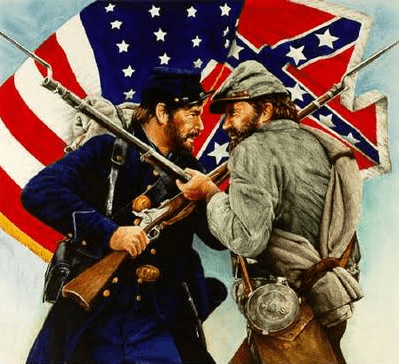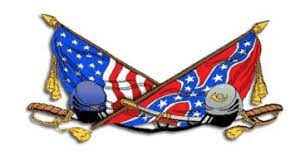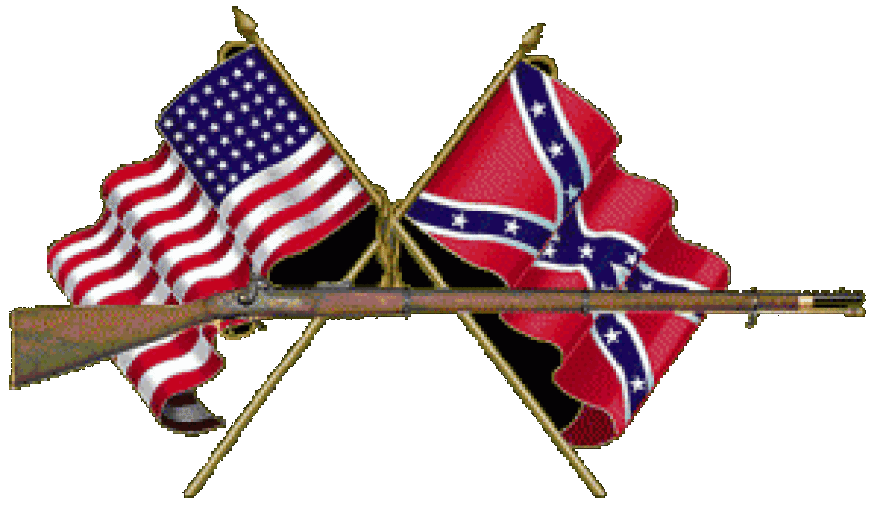Seven Days Battles

PENINSULAR CAMPAIGN–SEVEN DAYS’ BATTLES
No. 227. — Report of Maj. Gen. Thomas J. Jackson, C. S. Army, commanding Second Corps, of the battle of Gaines’ Mill, engagement at White Oak Swamp Bridge, and battle of Malvern Hill.
Extract
The four brigades of Jackson’s division did not act together during the engagement, but were called to separate fields of service. In pursuance of the order to charge the enemy’s front, the First Virginia Brigade, commanded by General C. S. Winder, moved forward through the swamp, and upon emerging into the open field its ranks, broken by the obstacles encountered, were reformed. Meeting at that point with the Hampton Legion, First Maryland, Twelfth Alabama, Fifty-second Virginia, and Thirty-eighth Georgia, they were formed upon his line. Thus formed, they moved forward under the lead of that gallant officer, whose conduct here was marked by the coolness and courage which distinguished him on the battle-fields of the valley. The enemy met this advance with spirit and firmness. His well-directed artillery and heavy musketry played with destructive effect upon our advancing line. Nothing daunted by the fall of officers and men, thinning their ranks at every step, these brave men moved steadily forward, driving the enemy from point to point, until he was finally driven from his last position, some 300 yards beyond McGehee’s house, when night prevented further pursuit.
PENINSULAR CAMPAIGN–SEVEN DAYS’ BATTLES
No. 257. — Report of Col. Bradley T. Johnson, First Maryland Infantry (Confederate), commanding Maryland Line, of the skirmishes at Hundley’s Corner, battles of Gaines’ Mill and Malvern Hill, and skirmish at Westover.
Extract
Arriving on the plateau in front of Gaines’ house I found it occupied by the enemy, and behind them a short distance a battery, which poured a continual and rapid fire into our troops in front of it. Their infantry held a strong position behind the bank of the road in front of Gaines’ house. I found to my horror regiment after regiment rushing back in utter disorder. The Fifth Alabama I tried in vain to rally with my sword and the rifles of my men. The Twelfth Alabama reformed readily on my right, and the North Carolina regiments of Colonel McRae’s command, at my appeal, rallied strongly on my left. Thus re-enforced, my men moved forward at a right-shoulder-shift, taking the touch of elbows and dressing on the alignment with the precision of a parade. Not a man was missing. Marching straight on, when a comrade fell not a man left the ranks, but the surgeons’ detail carried him off.
We gained the road and the house, when Brigadier-General Winder brought the First Brigade into line on my right and ordered me to put some Georgia regiments of Brigadier-General Lawton’s command on my left, to take command of the whole, and charge the battery. This was done. The whole line swept forward, but when close to the battery it limbered up and fled. Two of its pieces were found next morning in the road a mile from the position we charged.
The conduct of my men and officers is beyond praise. They marched, each one in his place, with a precision and firmness which can never be surpasse
PENINSULAR CAMPAIGN–SEVEN DAYS’ BATTLES
No. 258. — Report of-Maj. Gen. Daniel H. -Hill, C. S. Army, of egagement at King’s School-House and battles of Mechanicsville and Gaines’ Mill, engagement at White Oak Swamp Bridge, and battle of Malvern Hill.
Extract
In regard to the Twelfth Alabama General Rodes says:
The Twelfth Alabama, which in some confusion had shifted to the left late in the evening, joined the troops which came up on the left of Hill’s division.
Anderson’s brigade, on the left, met the Yankees on the edge of the swamp and was first engaged. The contest was short but bloody, and the woods were entirely cleared of the Yankees, who fell back behind a fence and ditch and the brow of a hill.
My division now occupied the edge of the wooded swamp, separated from the Yankees by an open field some 400 yards wide. Confederate troops upon our right, subsequently discovered to be Winder’s and Lawton’s brigades, were advancing across the plain to attack them. I found Generals Anderson and Garland discussing with great enthusiasm the propriety of attacking the Yankees in flank with their two brigades, while Lawton and Winder attacked in front. The only objection to the movement was that a Yankee battery on our extreme left could enfilade our line on its advance. Garland observed, “I don’t think it can do much harm, and I am willing to risk it.” Anderson responded in the same spirit, and I ordered an advance of the whole division. To prevent the destruction of life item the battery I resolved to make an attempt to capture it. Two regiments of Elzey’s brigade (I think) were found separated from their command, and these I ordered under my volunteer aide, Mr. Sydnor, perfectly acquainted with the ground, to get in rear of the battery, while the Twentieth North Carolina, Col. Alfred Iverson; the Third North Carolina, Col. Gaston Meares, and the First North Carolina, commanded by Capt. H. A. Brown, were ordered to make a direct advance. Unfortunately Colonel Iverson alone carried out his orders fully.
PENINSULAR CAMPAIGN–SEVEN DAYS’ BATTLES
No. 259. — Report of Brig. Gen. R. E. Rodes, C. S. Army, commanding First Brigade, of the battle of Gaines’ Mill.
HDQRS. FIRST BRIG., MAJ. GEN. D. H. HILL’S DIV.,
July 19, 1862.
MAJOR: I have the honor to make the following report of the operations of my brigade, composed of the Third, Fifth, Sixth, Twelfth, and Twenty-sixth Alabama Regiments, and Carter’s battery, making an-aggregate of about 1,460 men, from the evening of June 26 to that of June 28 last:
In common with the other brigades of Maj. Gen. D. H. Hill mine took position on the Mechanicsville turnpike on the morning of June 26. We lay there until late in the afternoon of the 26th, when we moved across the Chickahominy, taking position in the field between Mechan-icsville and the Chickahominy.
Next morning, after being subjected to a brisk shelling process from the enemy without loss except one horse, we moved forward in the road to the left of the Mechanicsville battery, halted near that battery, and about 9 or 10 o’clock moved to the road leading to Bethesda Church. General Ripley’s brigade followed, mine being in reserve on that day.
Following the preceding brigades of the division, we came under heavy artillery fire at New Cold Harbor, when we were ordered to take shelter for a time at this point. We were subjected to a heavy fire for a half hour or more, but lost only 2 men, Lieutenant Ramsay and a private of the Fifth Alabama. I sent out both Captain Whiting and Lieutenant Webster, of my staff, from this point to communicate with the major-general commanding, but in moving forward in person communicated with him myself, and under his order moved forward in line of battle to the support of General Garland in a contemplated attack upon the enemy’s battery to the left of Old Cold Harbor. Before the attack was made, however, the position of both Garland’s brigade and mine was changed, both brigades being wheeled on Garland’s left to the rear. Then we were ordered forward by Major-General Jackson to attack the enemy in front of New Cold Harbor, coming into the fight on the left of his troops. In crossing an almost impenetrable swamp to get into action great confusion ensued, from the fact that at the same point several brigades were crossing at the same time, and upon emerging from the swamp and striking the field beyond three of my regiments, the Fifth, Twelfth, and Twenty-sixth, were found on the left and behind, and the Sixth and Third Alabama on the right of Anderson’s brigade, which was in front of us. Before reaching the swamp I had received an order from or through Brigadier-General Ripley to charge through the swamp at double-quick time. This order was obeyed by my brigade with alacrity, but the three first-named regiments, finding Anderson’s brigade at a halt and in front of them engaged in a heavy fire of musketry, were halted; the Third and Sixth Alabama went on, however. The Third encountered troops of our own in front of them across the swamp. The Sixth did not, but moved on at a rapid pace into the field in front of the enemy’s battery and in the face of their infantry, encountering there an enfilading fire from the battery and a heavy fire of musketry in front; and finding themselves unsupported, the men were required by Colonel Gordon to lay down, and finally, no support arriving, they retired under cover in perfectly good order, and there awaited with the Third further orders.
Almost upon the return of the Sixth Alabama the brigades of Generals Anderson and Garland having in the mean time, with three of my regiments, been brought into some sort of alignment, were ordered to charge. The charge was intended to be general, and had been, I thought, extended throughout the line; but upon traversing the field before spoken of, and attaining the road beyond very nearly, I found upon examination of my line that two of my regiments had not moved with my brigade, and upon examining the line farther to the right found that they were not with General Anderson either, and that his right was at least the length of two or three regiments from the lower edge of the field and liable to be turned, while on the right of General Anderson’s brigade, the whole line having a moment before paused and hesitated, nearly if not the whole of the left of the division, as far as one in my position could see, broke and retreated in apparent confusion. I thought the whole of the brigade on the left of mine as well as my three regiments were involved in it.
At that moment, though the whole of General Anderson’s brigade seemed to be stanch at a halt, still his right, composed of regiments which joined him after his halt, wavered, and looking around for troops to sustain him I discovered some at the lower end of the field, to the rear, not engaged, but under artillery fire. I found them to be Colquitt’s brigade, and close to them on their left I found the Sixth and Third Alabama Regiments. Urging Colonel Colquitt to move up to Anderson’s right I ordered my two regiments directly forward to his support, and then moved up the original line to collect and return to the field, if possible, those who had fallen back from the left.
I arrived at the left in time to stop some fugitives, but was so utterly exhausted from weakness, proceeding from my wound (not yet by any means healed), that I could do no more. I found, however, that the confusion before spoken of on the left of the line had not been general; that my three first-named regiments had continued the charge, and had successfully and almost alone beaten back two large bodies of the enemy on the top of the hill, besides taking a battery of the enemy directly in our front. The Fifth Alabama Regiment, which took the battery, was sustained in this portion of the charge by the Twenty-sixth only, the Twelfth Alabama, in some confusion, having shifted to the left late in the evening and joined the troops which came up on the left of Hill’s division.
All the regiments and regimental officers acted handsomely; but the Fifth and Twenty-sixth were especially distinguished for their great courage. I feel confident that no troops ever acted better than they did on this occasion. Men and officers all acted nobly.
Col. C. C. Pegues, of the Fifth Alabama, was wounded desperately in the charge and has since died of his wounds. Upon falling he called to the next officer in command to him, Major Hobson, and told him that the Fifth had always been in the advance, and that it was his last wish that it should then go ahead and allow no regiment to pass it. Major Hobson gallantly carried out his wishes, and he led the regiment on constantly ahead of all others of the division except the Twenty-sixth, which kept, under its brave colonel (O’Neal), steadily with it.
Carter’s battery had but little to do, except receive the fire of the enemy, until late in the afternoon, when for a short time, under my orders, with two of his pieces, and later with his whole battery, under the orders of Major-General Jackson, it engaged the enemy’s battery to the left of the Cold Harbor field and silenced it. Fortunately the battery suffered but little loss. Captain Carter and his men on this occasion, as on a former one, behaved with distinguished gallantry.
The total loss of the brigade in this battle was 31 men killed and 114 wounded. Of these the Fifth Alabama lost 21 killed and 45 wounded. After causing the brigade to reassemble we slept on the field of battle. The brigade, under orders, moved down near the Grapevine Bridge and remained there during the day.
At the close of the day (Saturday), I was compelled, from the condition of my arm and from consequent fever, to turn over the command of the brigade to Colonel Gordon, of the Sixth Alabama. I desire to call especial attention to the conduct of the above-mentioned officer; it was distinguished for all that a soldier can admire.
My regular and volunteer staff officers- Captain Whiting, Lieutenants Webster and Peyton, and Messrs. Wood, Thomas Bouldin, V. H. Rodes, and Luresden- were of great service to me, and served me faithfully at great personal risk all the afternoon. Captain Whiting and <ar13_633>Lieutenant Webster deserve especial mention, however. The latter was killed in the charge across the field, after having given evidence of the greatest coolness and courage and of unusual intelligence.
I am under especial obligation, too, to Maj. B. G. Baldwin, who had rejoined my staff and had consented to act as lieutenant-colonel of the Sixth Alabama Regiment. Acting in both capacities at intervals during the day, he showed the highest order of soldierly qualities in both.
I submit herewith all the regimental reports that have been handed in. I have the honor to be, major, very respectfully,
R. E. RODES,
Brigadier-General, Commanding, &c.
Maj. J. W. RATCHFORD,
A. A. G., Hill’s Division.
List of killed and wounded in the First Brigade, Third Division, in the engagements of June 27 and July 1.
Command. Killed. Wounded. Missing.
JUNE 27.
3d Alabama 2 14 16
5th Alabama 21 45 66
6th Alabama 3 13 16
12th Alabama 1 11 12
26th Alabama 4 28 32
Carter’s battery …. 3 3
Total 31 114 145
JULY 1.(*)
3d Alabama 37 163 200
5th Alabama 26 61 87
6th Alabama 15 29 44
12th Alabama …. …. ….



